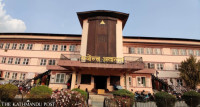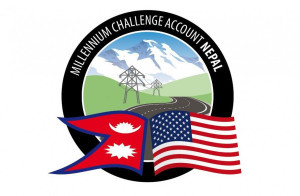National
A day after responding to Nepal’s concerns, MCC officials arrive in Kathmandu
Fatema Z Sumar and Jonathan Brooks, vice president and deputy vice president at the Compact Operations, are scheduled to meet Prime Minister Deuba and a host of leaders.
Post Report
Fatema Z Sumar, vice president of the Department of Compact Operations at the Millennium Challenge Corporation, and her deputy, Jonathan Brooks, have arrived in Kathmandu, a day after the United States dispatched its response to some concerns raised by the Finance Ministry regarding the American programme.
The American officials’ visit comes at a time when the incumbent Sher Bahadur Deuba government is making a push for the parliamentary ratification of the Millennium Challenge Corporation Nepal Compact, under which Nepal would receive $500 million in grants.
According to airport officials, the US delegation arrived in Kathmandu at around 9:30am.
Deuba’s coalition partners–the Communist Party of Nepal (Maoist Centre) and the CPN (Unified Sociliast)–have some reservations about the American programme.
On September 3, the Finance Ministry had sent a list of questions and concerns to the MCC headquarters seeking some clarifications surrounding the US programme.
In its 13-page response addressed to Finance Minister Janardan Sharma, the MCC has attempted to provide clarifications on all the questions and supplementary concerns, including whether the MCC agreement is above Nepal’s constitution and whether it is part of the Indo-Pacific Strategy.
Regarding the concern, if the MCC agreement is above the Nepal constitution, the MCC has said, “no.”
“The Constitution of Nepal prevails over the MCC Compact,” the MCC said in its response.
“Based on MCC’s experience in other countries, a compact’s status as an international agreement is critical to ensuring the implementation can proceed without delay, which is particularly important given the limited five-year implementation period of a compact,” the MCC said. “In practical terms, the status of an international agreement means that the implementation of compact projects will proceed in accordance with laws of Nepal except in rare instances where local law conflicts with a specific provision of the compact. In such a case, compact projects will be implemented according to the mutually agreed upon terms of the compact and the Constitution of Nepal.”
In response to the concern, if Nepal is a member of the Indo-Pacific Strategy, the MCC has said the MCC Nepal Compact is not an agreement under it.
“MCC compacts are agreements between the MCC and the partner government,” said the MCC. “Any decision of Nepal regarding the Indo-Pacific Strategy is separate and independent from the MCC Nepal Compact.”
The MCC also said that the strong relationship between the United States and Nepal long pre-dates the Indo-Pacific Strategy.
On a key concern by Nepal regarding the basis for the claims that Nepal is not prioritised under a military strategy, MCC has said the US law that governs MCC prohibits the programme from using funding for any military purpose.
“The compact is explicit about this legal prohibition,” said the MCC. “Therefore, there is no connection between the MCC Nepal Compact and any military alliance or defence strategy.”
During their stay in Kathmandu, the MCC officials are scheduled to meet Prime Minister Sher Bahadur Deuba and some key politicians, including KP Sharma Oli, Deuba’s predecessor and chair of the main opposition, the UML.
Nepal and the United States signed the agreement four years ago—in September 2017. At that time also, Deuba was the prime minister, backed by the Communist Party of Nepal (Maoist Centre). The US programme, which has become a cause of controversy in Nepal, with Nepali political parties sharply divided, has been awaiting its parliamentary ratification for over two years now.
When the MCC Nepal Compact was tabled in Parliament for ratification, the Maoist Centre had already merged with the UML to become the Nepal Communist Party (NCP).
The Oli government had introduced the MCC Nepal Compact to the House. However, amid growing differences in the Nepal Communist Party (NCP), Dahal took a rigid approach, opposing the MCC’s parliamentary ratification. The Nepal Communist Party (NCP) was invalidated by the Supreme Court in March this year, reviving the UML and the Maoist Centre.
Deuba then became prime minister in the second week of July backed by the Maoist Centre. As Deuba prepared to get the MCC Nepal Compact through the Parliament, Dahal was in a fix, as his party had vehemently objected to the idea.
Sources said the concerns to the MCC headquarters were sent, at the behest of the Maoist Centre, as part of an attempt at face-saving.
Insiders say since the MCC has said Nepal’s constitution prevails over the agreement, it is not part of any security alliance and it is not aimed at military funding, the Maoist Centre backtrack on its earlier rigid position. The UML, which when in power was all for the MCC’s parliamentary ratification, however, now appears opposed to it.




 22.07°C Kathmandu
22.07°C Kathmandu
















